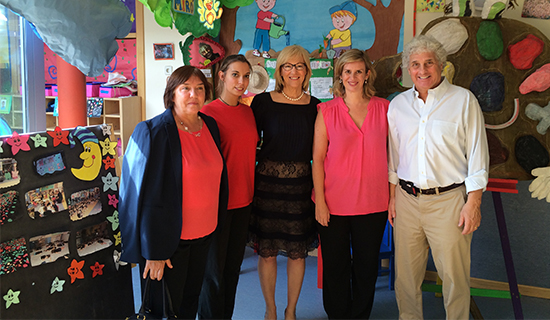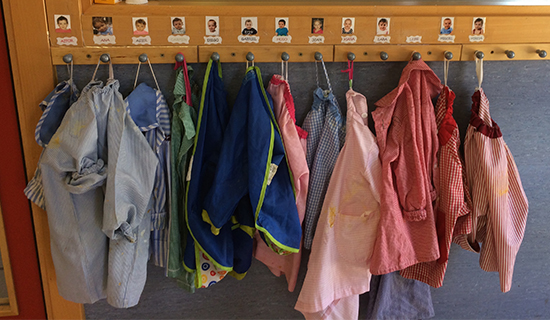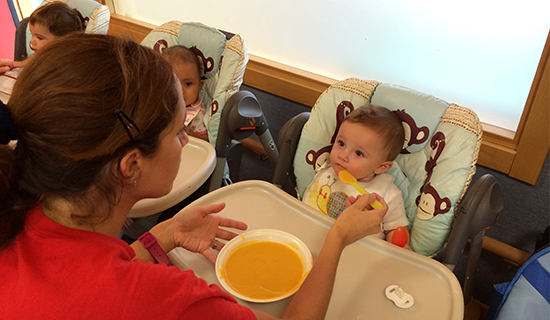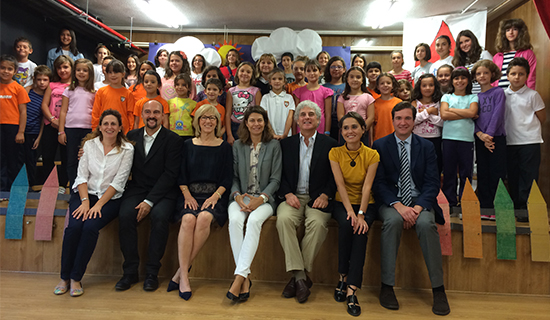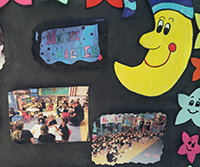
A typical preschooler in Madrid experiences lessons in art, languages, life skills and even an occasional sleepover at school, known as "magical night."
What may seem even more magical, at least to parents in the United States, is the cost.
"Spain has a well-thought out preschool program and most of the kids in the entire country can get access to free or low-cost daycare or preschool," Institute for Learning & Brain Sciences (I-LABS) co-director, Andrew Meltzoff, said in an email from Spain.
He and Patricia Kuhl, co-director of I-LABS, recently spent an intense work week in Madrid. They spoke with Spanish education officials, visited preschools, and gave invited lectures on child development based on their research conducted at the Institute.
Their visit is part of a budding partnership between the University of Washington and Spain. The partnership includes the UW College of Arts and Sciences' newly-launched Center for 21st Century Liberal Learning, which kicked off this summer with a 3-week study abroad program in Leon, Spain. The initiative aims "to discover a new kind of learning for the 21st century."
Earlier this year, Spanish education officials came to UW's campus in Seattle. Their visit included a stop at I-LABS, where they toured research facilities, met with I-LABS scientists, and explored some of the exhibits I-LABS uses to communicate neuroscience to children and parents. (See photos of the visit.)
The hope is to continue building the collaboration, including translating I-LABS online early education and brain science training tools into Spanish, and plans are underway for students from Spain to come to Seattle for a year to receive scientific training about brain development at I-LABS.
In Madrid, Meltzoff and Kuhl joined Lucia Figar, the minister of education in Madrid, for visits to preschools. The photos below give some of the highlights.
Kuhl and Meltzoff explained some of what they saw at the school:
- The coat rack is labeled with each child's name and picture, so that the kids can learn to identify their own things as a way of building autonomy.
- Singing and playing in groups, and lessons that already incorporate bilingualism into daily activities.
- Art, colors and appreciation for Spanish literary and artistic heroes surround the children on classroom walls.
- Sleeping over at the school, known as "magical night," is a special event enjoyed by the children and their parents.
"There are colors, singing and group activity everywhere and the teachers are so well trained, creative in what they do with the kids, and very dedicated," Meltzoff summarized.
In Madrid, the researchers were also featured at events October 1 at La Fundación Rafael del Pino, a non-profit organization in Spain that supports leadership, entrepreneurship, education, and other initiatives. Addressing a full auditorium that included teachers, parents, business and political leaders, high-school students and university administrators, Kuhl spoke on "Early Learning, Brain Development, and Bilingual Language Experience," and Meltzoff spoke on "Minds, Brains, and How Children Learn from Culture."
Later that day Meltzoff and Kuhl gave a joint evening lecture, "Understanding How Brain Development and Child Learning will Advance the Future of Nations." The event was one of the foundation's "Master Lectures," a series intended to disseminate the ideas of prominent figures.
The international travel and high-profile lectures are part of I-LABS' efforts to communicate its research findings to policymakers, educators, parents and others who are making decisions about preschool, bilingual training, and other early learning and child development issues.
"In each country we visit, we find policymakers who are wanting to do the right thing but often feel unsure how to proceed," Meltzoff said. "There is a natural link between the research done by colleges and universities and the well-being of our nation. Society will advance if we transfer scientific discoveries to practice and nurture and educate our next leaders, scientists, poets and citizens."
Meltzoff and Kuhl shared some photos from their visit to a preschool in Madrid:
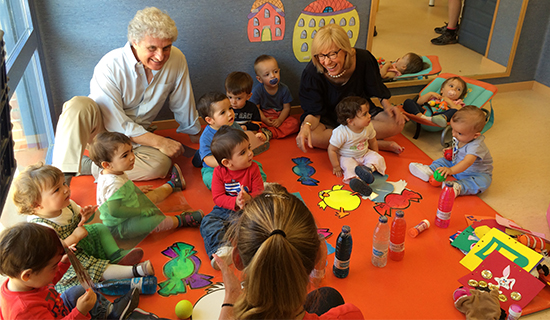
Above: Meltzoff and Kuhl play with children at a preschool in Madrid.
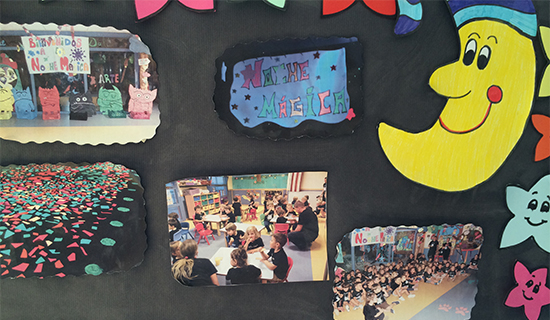
Above: A colorful bulletin board at the preschool advertises "Noche Magica," a sleepover at the school.
